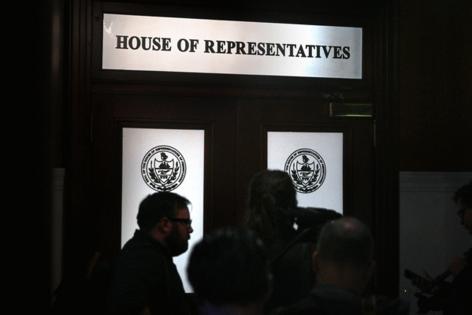Pennsylvania House approves $50.1 billion state budget as monthslong impasse nears an end
Published in News & Features
HARRISBURG, Pa. — The Pennsylvania House approved a nearly $50.1 billion state budget Wednesday as part of a breakthrough deal, clearing a key hurdle to end the state’s four-month-long budget stalemate.
If the deal is approved by the Republican-controlled state Senate — as is expected to occur later on Wednesday — it would mark the first time Pennsylvania’s state budget has topped $50 billion, as state spending and revenue has skyrocketed in the post-COVID years due to federal cash infusions.
The $50.1 billion spending plan passed the House in a 156-47 bipartisan vote. The overall budget deal, which was made public Wednesday, addresses significant priorities for both Democrats and Republicans — while leaving some long-sought efforts behind.
Among the top wins for Senate Republicans is the state’s expected exit from the Regional Greenhouse Gas Initiative, which former Democratic Gov. Tom Wolf joined without legislative approval in 2019. The program has been the ire of Republicans ever since, which House Minority Leader Jesse Topper, R-Bedford, called in floor remarks Wednesday the “No. 1 issue holding Pennsylvania back from economic growth.” The 12-state program, known as RGGI, is an interstate cap-and-trade initiative that charges power plants for how much carbon emissions they release into the air.
House Majority Leader Matt Bradford, D-Montgomery, a top negotiator of the budget deal, told The Inquirer on Wednesday that Democrats’ agreement to leave RGGI was part of a broader compromise to end the monthslong budget impasse that had delayed state payments to schools, counties and nonprofits.
“I’m one who believes there should be a price on carbon, but I recognize the reality of the situation and compromise is required,” Bradford added.
Gov. Josh Shapiro and Democratic leaders were able to convince Republicans, in turn, to spend more than they had wanted to this fiscal year. That additional spending allowed Democrats to invest more in public education, school building rehabilitation investments, a new earned-income tax credit targeted toward “working Pennsylvanians,” and more.
The state budget deal includes more than $665 million in new funding for public schools, approximately $562 million of which would be funneled through the state’s adequacy and tax equity formulas as part of the state’s effort to close what experts call a $4 billion “adequacy gap.“ These formulas were created last year in response to a 2023 court ruling that found Pennsylvania’s public education funding system unconstitutionally deprives students from poorer districts from an adequate and equitable education.
In addition, there are long-sought changes expected for cyber charter schools and how they are paid by local districts by approximately $178 million. Leaders from 10 of the state’s 14 cyber charter schools warned legislators in a letter Tuesday night that the funding cuts to the popular online alternative would be greater than the state’s estimate, and could result in 2,000 teacher and staff layoffs and the closure of several cyber charter schools.
The deal, however, does not include any additional funding for mass transit, another major Democratic priority. Democrats removed mass transit from the table in September, after a lawsuit required SEPTA to undo its service cuts and Senate Republicans appeared unwilling to make a long-term investment in mass transit. Instead, Shapiro approved that SEPTA use its capital funds to help fill the state’s largest mass transit agency’s budget deficit for the next two years.
Negotiations over the budget had been stalled for months until the end of October, when Shapiro convened top legislative leaders to return to talks. The renewed budget negotiations included House Speaker Joanna McClinton, D-Philadelphia, and Senate President Pro Tempore Kim Ward, R-Westmoreland, who are the highest-ranking officials in their respective chambers but usually stay out of the budget talks led by Bradford and Senate Majority Leader Joe Pittman, R-Indiana.
Unlike the federal government, Pennsylvania’s state government does not entirely shut down when a budget has not been approved. Lawmakers and state employees have not seen paychecks stop despite the impasse lasting 135 days, as of Wednesday. But the late budget has had significant impacts on school districts, counties, and social service providers — all of which have not received their billions in expected state payments. The lack of state funding has required schools, counties and service providers to cut jobs, take out expensive loans, or stop services all together.
The Senate is expected to approve the spending plan later on Wednesday, and all of the budget bills are expected to reach Shapiro’s desk by the end of the day.
©2025 The Philadelphia Inquirer, LLC. Visit at inquirer.com. Distributed by Tribune Content Agency, LLC.







Comments